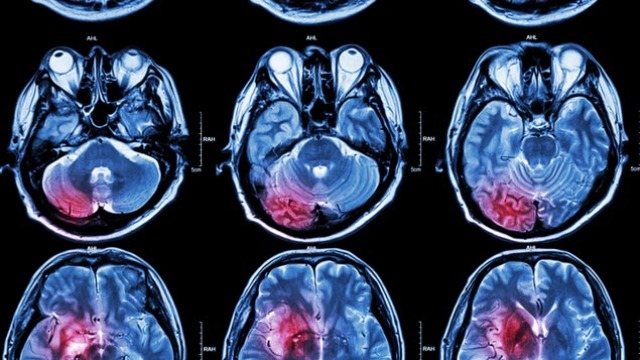Source: Thailand Medical News Nov 01, 2019 5 years, 5 months, 3 weeks, 4 days, 11 hours, 23 minutes ago
Researchers from the University of Pennsylvania have developed a blood tests or rather to be more precise a
liquid biopsy, that can predict
brain cancer prognosis. The team are the first to demonstrate that glioblastoma (GBM) patients with a higher concentration of cell-free DNA (
cfDNA) have a shorter progression-free survival after they are diagnosed compared to patients with less
cfDNA, and that
cfDNA concentrations increase in patients at the time of, or just before, their disease progresses.

Cell-free DNA is the free DNA that is found circulating in blood that has been released by dying cells. It is typically fragmented into small pieces. Cell-free DNA is shed by most types of cells in the body and thus can be found in the blood of all individuals, even when healthy.
A Blood test that measures the level of
cfDNA in the bloodstream is known as a
liquid biopsy. These types of blood tests are being increasingly used in diagnostic medicine, particularly in cancer. Since the tumor cells of cancer patients also shed cell-free DNA, a cancer patient will often have a portion of their cell-free DNA that originated in the tumor. This cell-free tumor DNA provides us with a non-invasively accessible “liquid biopsy” that molecularly represents the genetic signature of the tumor.
Dr Erica Carpenter, Ph.D., director of the
Liquid Biopsy Laboratory and a research professor of Medicine at Penn in a phone interview with
Thailand Medical News commented "Doctors have begun using liquid biopsies more frequently to monitor certain cancers, particularly lung cancer, in recent years as research has shown their effectiveness in other disease sites. But until now, there has been little focus on the clinical utility of liquid biopsy in brain tumors.”
The medical research study cohort included 42 patients that had received a new diagnosis of GBM, aparticularly aggressive form of
brain cancer. The five-year survival rate for GBM patients is between five and 10 percent. A challenge for physicians treating these patients is that monitoring GBM via imaging can prove inaccurate, and the tumors are often heterogenous, meaning different sections of the tumor contain different genetic mutations. Consequently, treatments targeting one particular area of the tumor may not be effective against other parts of the tumor.
A major concern is that obtaining a tissue sample for analysis in GBM patients requires a repeat brain surgery, making it difficult to track the progression of the cancer without extremely invasive procedures.
"There are many challenges associated with our current diagnostic approaches to brain tumors.
; Repeatedly obtaining tumor tissue from the brain is highly invasive and risky, so we are currently limited in our ability to monitor the genetics of brain tumors during the course of treatment. We also have a hard time predicting which patients with newly diagnosed brain tumors, such as glioblastoma, will do well with standard of care treatment and which patients will do poorly. "commented Dr Stephen J Bangley, an assistant professor of Hematology-Oncology in Penn's Perelman School of Medicine and lead author in a phone interview with
Thailand Medical News.
"Lastly, and perhaps most problematic, our currently available imaging scans of the brain are not as accurate as we'd like for assessing response to treatment. Damage from brain radiation and tumor growth can look very similar on an MRI, for example. The ability to serially monitor cell-free DNA in the blood, or in other fluids such as cerebrospinal fluid, may ultimately be able to help address these problems in patients with brain tumors." he further added during the phone interview with
Thailand Medical News.
In this novel study, the 42 GBM patients had a number of blood tests taken, at diagnosis, before tumor removal, and at regular intervals throughout the course of their chemotherapy treatment.
When a patient provides a blood sample, plasma also known as the liquid, acellular fraction of whole blood is obtained by centrifugation. Cell-free DNA can then be extracted from the plasma and used as an input for downstream molecular analysis. In this study, the analysis was achieved through a process known as next-generation sequencing, in which a panel of genes was analyzed for mutations across all the coding regions of each gene.
In the study, 28 patients were found to have a lower concentration of
cfDNA pre-surgery. This was defined as
cfDNA that was below the average calculated for the entire cohort. These patients were found to have almost double the progression free survival (9.5 months) when compared to the 14 patients that had higher concentrations of
cfDNA (median 4.9 months).
The medical researchers also compared the genetic sequencing of solid tissue biopsies in GBM with the liquid biopsy results. They found that, whilst both biopsies detected genetic mutations in >50% of patients, none of the mutations overlapped. This suggests that liquid biopsies may be able to offer complimentary information to traditional tissue biopsies.
Dr Stephen J. Bagley added "If
liquid biopsy can give us a more comprehensive view of the molecular profile of the tumor, we can potentially pick more effective combinations for each patient."
The researchers emphasize that the current results are hypothesis-generating rather than practice changing. Since these glioblastoma tumors are notoriously heterogenous, meaning that the tumor
genetics can vary in different parts of the same tumor, the researchers hypothesize that adding
liquid biopsy to standard tumor sequencing may generate a more complete picture of the tumor's genetics. The team is also planning more cohort studies on the
liquid biopsy protocol.
Reference: Bagley et al. 2019. Clinical utility of plasma cell-free DNA in adult patients with newly diagnosed glioblastoma - a pilot prospective study. Clinical Cancer Research. DOI: 10.1158/1078-0432.CCR-19-2533.
